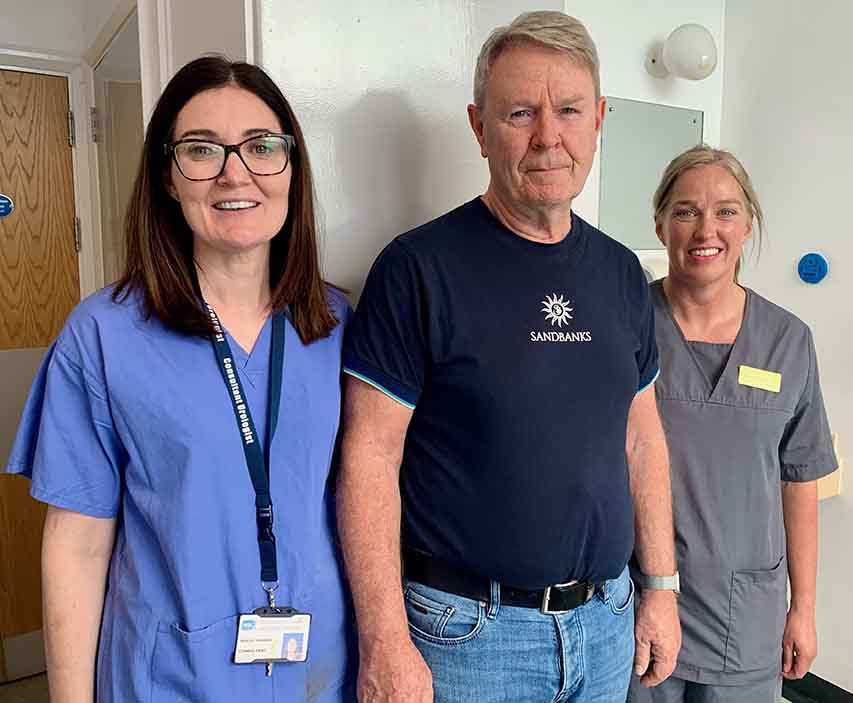A bladder cancer patient shares his story during urology awareness month to encourage others to take medical advice
- Reading this article could save your life.
A Bangor man has survived bladder cancer thanks to the attention he received from dedicated professionals in the health service.
“I feel that the hospital has me in its arms and I am being taken care of.” Jeremy Stewart (65) from Bangor who had been having routine blood tests for his prostrate when a scan discovered a shadow on his bladder which turned out to be cancerous.
As part of September’s Urology Awareness Month, which shines the spotlight around Urology diseases including bladder, kidney, prostate and male reproductive cancers and non-malignant conditions including incontinence, urinary tract infections (UTIs), erectile dysfunction and kidney stones, Jeremy is urging those who may feel that something may be off, to not, “hesitate” and seek medical attention.
Statistics show that one in two people will be diagnosed with a Urology condition in their lifetime, while one in eight men will be diagnosed with Prostate Cancer.

Jeremy added: “I had the cancer removed, I had chemotherapy and three monthly update appointments.
“Being diagnosed was something that I never knew would happen to me, but now that it has happened I’m happy that the hospital has me in its arms and I’m being taken of, I feel happy in that.
Jeremy described the Urology staff at the Ulster Hospital as, “Careful, kind and gentle people.” adding that “the staff here have made me feel very comfortable. They have made me feel very dignified.
“My message is do whatever you can to look after yourself. A lot of men that I know tend to push things such as these types of issues away and that can led to early demise.
“I think it is so important that people are aware how easy things like this can develop without any pain as I didn’t have pain. If there is any indicator that something is not right, people should not hesitate.
“Don’t be embarrassed, the staff at the Ulster Hospital are here to help. You are in their arms and you are protected.”
Advanced Nurse Practitioner (ANP) Claire Cassells stressed how early treatment and intervention of Urological conditions, “Will promote quality of life for patients.”
She added: “September is Urology Awareness month so it is an important opportunity to increase public awareness, knowledge and understanding of Urology cancers and conditions.
“The theme this year is ‘Men’s Urology Myths and Legends’ which focuses on the common myths around men’s Urology health, promoting and encouraging men to open up and seek support,” said Claire.
Claire added: “Urology health in men and women relates to the Urology system responsible for storing and discharging urine as well as the parts of your body used in sexual function such as the prostate, penis and testicles.
“We are urging men to recognise when something is not right below the belt – to be a ‘legend’ and speak out and get help. We recognise that there are real barriers for some men to speak to healthcare professionals, but if something feels off, don’t hesitate. Early detection and treatment are key and you are not alone.”
Urology Consultant Maeve Dooher explained: “Between men and women we know that there are 750,000 Urological cancers diagnosed every year.”
“We would advise any patient if they notice any change in their urinary symptoms or blood in their urine that they go to the GP.
“It could be simple investigations that are needed to address the issue and it is important to attend.”
“There are other conditions that are non-cancerous that can affect the urinary tract such as a slow flow, or any pain in the flank.
“They are all important symptoms and can be treated with lifestyle changes or medication. It is so important to seek medical attention and we can address it.
“Men and women should not be embarrassed about any condition that affects their bladder, their penis or testicles as the vast majority can be easily treated.”
























